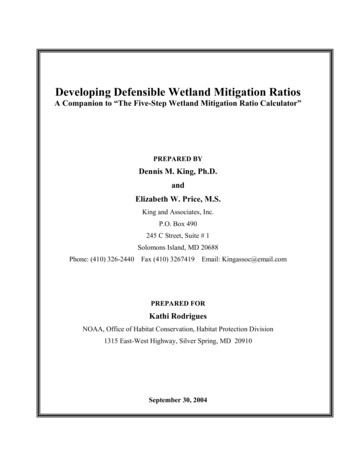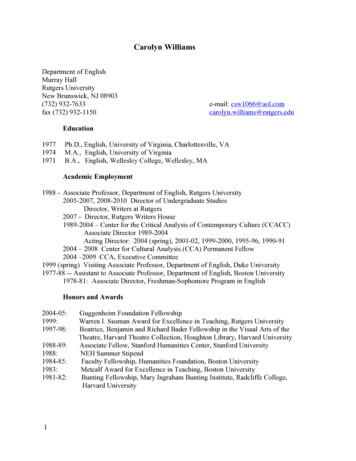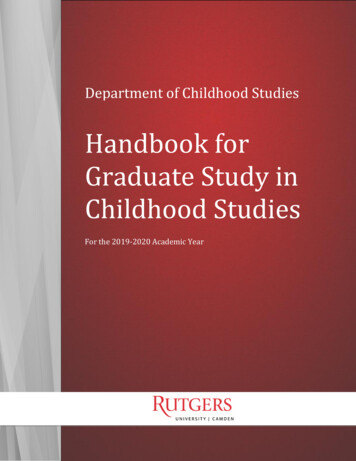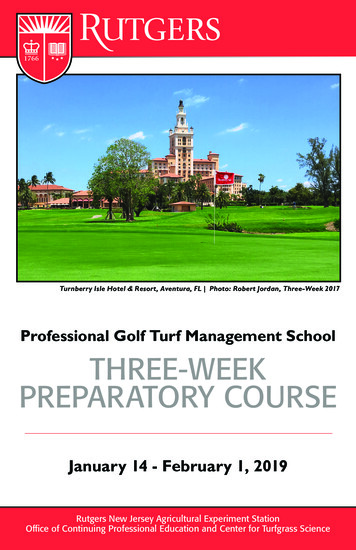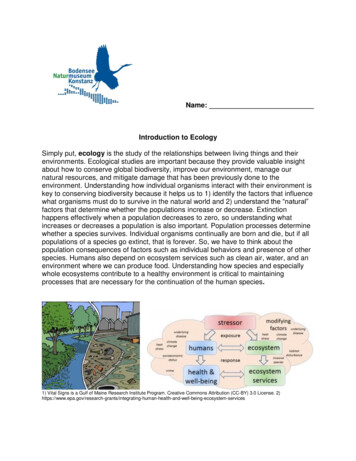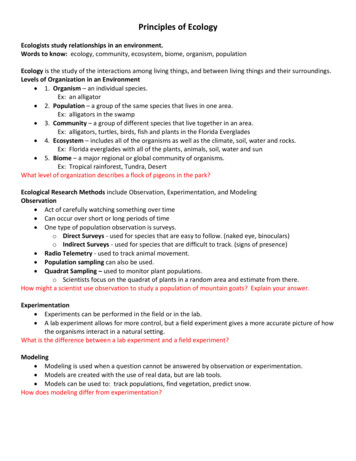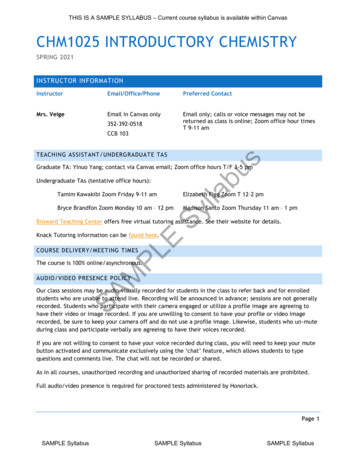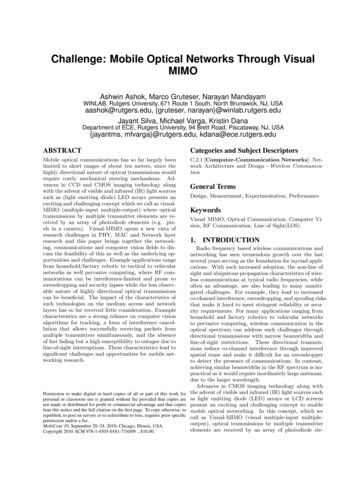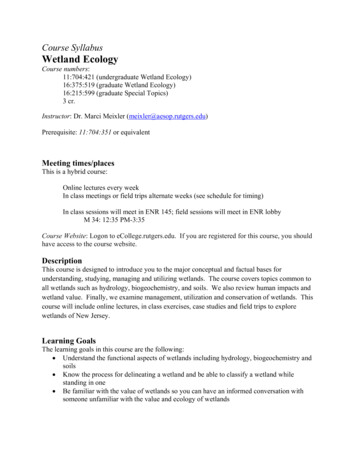
Transcription
Course SyllabusWetland EcologyCourse numbers:11:704:421 (undergraduate Wetland Ecology)16:375:519 (graduate Wetland Ecology)16:215:599 (graduate Special Topics)3 cr.Instructor: Dr. Marci Meixler (meixler@aesop.rutgers.edu)Prerequisite: 11:704:351 or equivalentMeeting times/placesThis is a hybrid course:Online lectures every weekIn class meetings or field trips alternate weeks (see schedule for timing)In class sessions will meet in ENR 145; field sessions will meet in ENR lobbyM 34: 12:35 PM-3:35Course Website: Logon to eCollege.rutgers.edu. If you are registered for this course, you shouldhave access to the course website.DescriptionThis course is designed to introduce you to the major conceptual and factual bases forunderstanding, studying, managing and utilizing wetlands. The course covers topics common toall wetlands such as hydrology, biogeochemistry, and soils. We also review human impacts andwetland value. Finally, we examine management, utilization and conservation of wetlands. Thiscourse will include online lectures, in class exercises, case studies and field trips to explorewetlands of New Jersey.Learning GoalsThe learning goals in this course are the following: Understand the functional aspects of wetlands including hydrology, biogeochemistry andsoils Know the process for delineating a wetland and be able to classify a wetland whilestanding in one Be familiar with the value of wetlands so you can have an informed conversation withsomeone unfamiliar with the value and ecology of wetlands
Have a working knowledge of management techniques, creation/restoration, andregulation of wetlandsTextbookMitsch, W. J. and J. G. Gosselink. 2007. Wetlands. 4th edition. 582 pp.Grading SystemThe course is comprised of readings, online lectures, case studies, assignments, and exams.Readings: weekly readings can be found in our textbookOnline lectures: you can find these on the Ecollege websiteCase studies (grads only): There will be weekly case studies related to the topic of the week.Graduate students will be responsible for creating the case studies (more info on this in theGraduate Students section below).Assignments: Each week that there is a video lecture you will be responsible for creating anoutline based on the lecture. Submit your outlines to the dropbox in the following formatOutlineX lastname firstname (where X is the number of the week). All outlines are due beforeclass the following week. In addition, before the midterm and final you will be expected tosubmit review questions and answers (multiple choice/TF/matching/essay, your choice; 1/topiccovered since the beginning of class or the last exam) to the dropbox by midnight before class.Exams: There will be one midterm and a final exam. Both are open book but limited in terms oftiming. You can take exams anytime up to the deadline (see schedule). Study the following tohelp prepare for the exams: online lectures, case studies, handouts in class, and relevant bookchapters.Graded e studies0%10%Outlines (9) and review assignments (2) 55%55%Midterm Exam20%15%Final Exam20%15%Graduate studentsGraduate students will be expected to work at a higher level than undergraduates. As such,graduate students will be responsible for activities that help to link theory with application forthe rest of the students. Graduate students will be expected to:1) go more in depth on the assignments than undergraduates2) present case studies to the class (see example in week 1)
Case studies: Case studies are helpful in linking theoretical concepts to application of thoseconcepts in real life. Your case study should bring to light interesting management questions orcontroversy related to the topic of the week based on research articles in the literature ormanagement plans.Presentations could be 1) created in Powerpoint as a slideshow with enough words fordescription so someone viewing it will understand without the need for spoken words, 2) createdin Powerpoint as a narrated video (for instructions see: x), or 3) created as anarrated video using Windows Movie Maker or Imovie (for instructions see:http://www.youtube.com/watch?v thMepkgXUsQ orhttp://www.youtube.com/watch?v Thv5BOP2Xgc).Your case study should be posted to the dropbox on the Ecollege website by midnight on theSunday before the week in which your topic is presented. That way I can make it available foreveryone.
Class scheduleWeeks in gray indicate that we meet in person in room ENR 145 or the ENR lobby if going outin the fieldBring boots and foul weather gear on field trips. We’ll go rain or shine.All outlines due before class. Review questions/answers and case studies are due midnightbefore class.WeekDateOnline lectureTopic1Sep mations4Sep30Wetlandclassification5Oct 7Wetlandmanagement6Oct14Wetland values7Oct21In classactivityBookchapterWetlandsoverview1, 2, 14Abbott MarshfieldtripWyckoffdelineationfieldtripCase studyOutline due4Case studyhydrologyOutline intro5, 6Case studychemOutline hydrology8Case studyclassificationOutline chem9Case studymgmtOutline wet class11(p.333356)Case studyvaluesOutline mgmtIn class reviewOutline valuesReviewquestions/answers(due midnightbefore class)8Oct28Midterm examonline (takebefore midnightOct 28)9Nov 4Human impacts10Nov11WetlandconservationCheesequakefield trip9, 10Case studyimpacts14Case studyconservationOutline impacts
11Nov18Wastewatertreatment12Nov25Creation andrestoration13Dec 2MeadowlandsfieldtripIn class review13Case studytreatmentOutlineconservation12Case studycreation/restOutline rs(due midnightbefore class)14Dec 9Final examonline (noncumulative, takebefore midnightDec 9)
Instructor: Dr. Marci Meixler (meixler@aesop.rutgers.edu) Prerequisite: 11:704:351 or equivalent Meeting times/places This is a hybrid course: Online lectures every week In class meetings or field trips alternate weeks (see schedule for timing) In class sessions will meet in ENR 145; field sessions will meet in ENR lobby M 34: 12:35 PM-3:35
